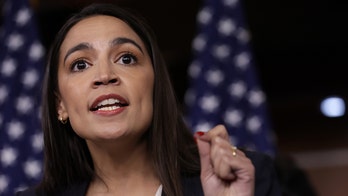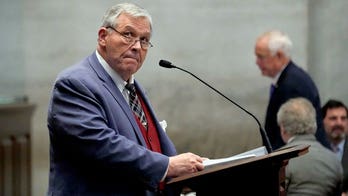ROCHESTER, Mich. – If it's too big to fail, it's too big, several Republican presidential candidates said Wednesday, arguing in the latest 2012 debate that housing and tax reforms, as well as an end to government bailouts, are critical to stopping the U.S. economy's slide into mediocrity.
In what was largely a friendly debate -- with most of the candidates' ire directed toward the current administration rather than each other -- the most unforgettable moment of the night came when Texas Gov. Rick Perry stumbled in a moment of forgetfulness. Perry's brain freeze came when he couldn't remember the three agencies that he would pledge to get rid of as president.
"Sorry. Oops," he said, after recalling only the departments of Commerce and Education. He later said he also wanted to abolish the Energy Department.
But the candidates were not short on other ideas for reducing the size and scope of government and getting companies to begin hiring.
The result, they agreed, is an environment where the private sector is being sidelined for a public support system that does little to encourage independence, ingenuity and entrepreneurism.
Democrats think it's "a bad thing" when corporations are profitable, said former Massachusetts Gov. Mitt Romney, the persistent front-runner in the race. And part of the reason for that misconception is that so many Americans don't know what profits do, he said.
"Profit is what is left over after (expenses, salaries and bonuses) have all been paid. What happens with profit is that you can grow the business. You can expand it. You have working capital and you hire people. The right thing for America is to have profitable enterprises that can hire people," he said.
Businessman Herman Cain said the new banking law named after former Sen. Chris Dodd and Rep. Barney Frank had created an environment of uncertainty that had helped lead to a casino-style stock market.
Two other problems with Dodd-Frank, he said, "Dodd and Frank."
Touting his 9-9-9 tax plan, Cain added that "thousands of hidden sneak-a-taxes" in the current code are killing the environment for businesses. "That's why I want to throw it out."
Former House Speaker Newt Gingrich said all the Republicans on the stage agree the tax policies lead to jobs because that had been demonstrated twice in his lifetime -- during the era of Ronald Reagan, and the "Contract with America" that Gingrich crafted.
Both those programs shared policies of lower taxes, less regulation, more homegrown energy and "faith in the American job creator," he said, "as distinct from the Saul Alinsky radicalism of higher taxes, bigger bureaucracy with more regulations, no American energy, as the president announced again today in his decision on offshore (drilling), and finally class warfare."
Gingrich, who repeatedly took shots at the media, including the CNBC panel that was hosting the event, said insecurity within the economy has only gotten worse under Federal Reserve Chairman Ben Bernanke. Gingrich said he would audit the Fed and demand to see the documents that show why Bernanke agreed to bailouts of the nation's largest banks.
Texas Rep. Ron Paul said the U.S. government must also get rid of Fannie Mae and Freddie Mac, the mortgage giants seized by the government that asked for $7.8 billion more this week to cover losses that are now approaching $200 billion while they backs $7 trillion in loans. Paul, who proposes that as president he would cut $1 trillion out of the budget in five departments, said the Federal Reserve is price-fixing by manipulating interest rates.
"That gave us the bubble, destroyed the economy," he said.
Speaking in Michigan near Detroit, the headquarters for the Big Three auto companies, two of which received $68 billion in government bailouts, former Utah Gov. Jon Huntsman said when all is said and done, taxpayers will take a $15 billion hit.
"There ought to be some way of taking the auto sector through some sort of reorganization, get them back on their feet. The people in this country are sick and tired of seeing taxpayer dollars go toward bailouts, and we're not going to have it anymore in this country," he said.
Minnesota Rep. Michele Bachmann, who repeatedly criticized the president for spending in his health care law that hasn't yet gone into full force said Obama is more concerned with his reelection than with righting a listing ship.
"He should really be going to job-creators if he wants to know how to create jobs. Instead, he continues to go to a General Axelrod in Chicago to look for his orders to figure out how to deal with the economy. That won't work," she said, referring to Obama's senior adviser David Axelrod, who's running the president's re-election campaign.
Former Pennsylvania Sen. Rick Santorum said if the Republican Party only cared about lowering the top tax rate, it wouldn't be getting elected into office. He said not everyone can be the over-educated or the 1 percent of high-income earners that Wall Street protesters are targeting, so he has formed a tax plan aimed at bringing manufacturers back to the United States so that they begin hiring at home.
"It may not be the boldest plan in the world, but it's one that will work. It'll put people back to work," he said.
Gingrich and Paul also blasted the college loan system, with the former speaker calling it an "absurdity" that "expands the ability of students to stay in college" while tolerating higher and higher tuitions. Paul suggested that the loan system be replaced with pay-as-you-go spending the same as any other product or good.
Pointing to his own leadership, Texas Gov. Rick Perry said not only his flat tax plan, but a regulatory structure that attracts business is the way to bring jobs back.
"There is a reason that Caterpillar moved their hydraulics manufacturing and their engine manufacturing to the state of Texas. It didn't have anything to do with Republican versus Democrat. It had everything to do with creating a climate in our state where the job creators knew that they were going to have the opportunity to keep more of what they work for," he said.
The hopefuls agreed that Europe's countries should take care of themselves, and not count on the U.S. to provide any relief for their mounting debt.
"Europe is able to take care of their own problems. We don't want to step in and bail out their banks and their economies," Romney said. Even so, he said the United States should continue contributing to organizations like the International Monetary Fund that are working to prevent a meltdown in troubled economies overseas.
Paul said Europe should "liquidate."
Cain said there wasn't much the United States could do to directly to help Italy at present because the economy there is in such difficult shape.
"We need to focus on the economy or we will fail," he said, referring to the U.S. and calling for spending cuts, a strong dollar and measures to stimulate growth.
Cain earned strong applause from the audience -- and the moderators earned boos -- when asked about accusations from several women that he sexually harassed them when he led the National Restaurant Association.
Cain said that the American people "deserve better than someone being tried in the court of public opinion based on unfounded accusations."
"I value my character and my integrity more than anything else. And for every one person that comes forward with an unfair accusation there are probably, there are thousands who come forward and say none of that ever happened with Herman Cain," he said.
Cain added that since the allegations surfaced more than a week ago, "voters have voted with their dollars," and supported his campaign.
Asked about the claims against Cain, Romney said it wasn't for him to respond, and "people can make their own assessment."
Romney also rejected charges that he is a flip-flopper, calling himself "a man of steadiness and constancy," evidenced by his 42-year marriage and the 25 years at Bain consulting firm.




